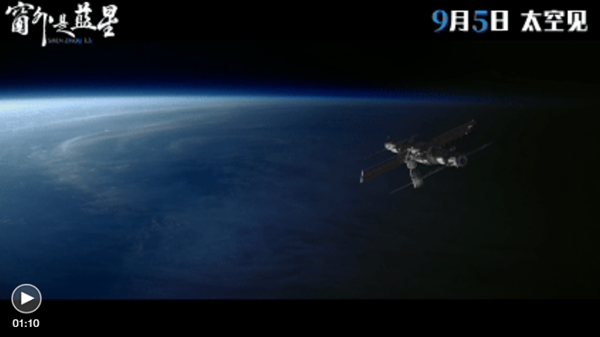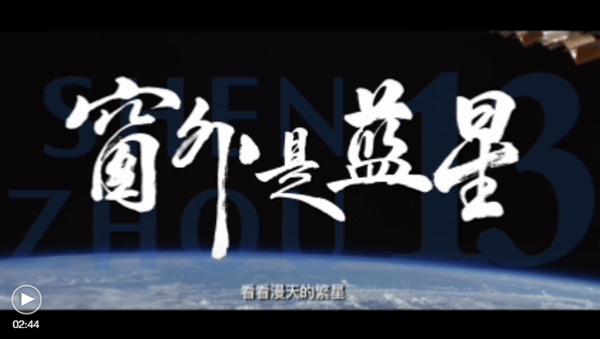Chinese movies dare to boldly go into space
China has dared to boldly go where no cinematographer has gone before with its first 8K movie filmed in space, marking a milestone for both Chinese cinema and space storytelling.
The space documentary "SHENZHOU 13" – or "Blue Planet Outside the Window" in English – filmed in 8K ultra-high-definition cameras by Chinese astronauts Zhai Zhigang, Wang Yaping, and Ye Guangfu during their mission from October 2021 to April 2022 aboard China's space station, premiered in theaters on Friday.
The 90-minute feature film chronicles the Shenzhou-13 crewed mission, which achieved China's first six-month stay in orbit and marked the country's first spacewalk by a female astronaut, Wang Yaping.
Narrated largely in Wang's voice, the film presents zoom-out, "blue marble" views of Earth from 400 kilometers above, and also intimate close-ups of the astronauts' lives in orbit: exercising, getting haircuts, playing musical instruments, having video calls with family, celebrating the New Year, giving lectures and filming 8K footage.
The movie also depicts the trio's valuable work in space, including the in-orbit transposition of the spacecraft and robotic arm operation of heavy loads, accumulating valuable experience for the subsequent in-orbit assembly and construction of the space station.
The movie was only made possible after China established a long-term presence in space and stable operations of the China Space Station.
"We now have the potential to create films and television shows," said director of the movie Zhu Yiran, also a documentary director at China Media Group.
How to film 8K in space?
Producing a film in space is fraught with hurdles, first and foremost the equipment itself. "In microgravity, machinery drifts; launch vibrations could dislodge components; charging standards must align; and the station must remain free of odors and interference with scientific instruments – a whole suite of requirements," Zhu explained.
Heavy, earth-bound 8K cameras had to be adapted for the unique and harsh conditions of space. The production team collaborated with aerospace engineers and seven equipment firms to completely redesign the cameras.
After six months of relentless tinkering, they miniaturized four cameras down to the size of three cargo parcels. The specialized filming equipment was then delivered to the space station via China's Tianzhou cargo spacecraft.
'No retake'
For this space filming, the entire process used the 8K/50fps format. The higher resolution meant the precious footage consumed an enormous amount of storage. A 1-terabyte card could only hold about a dozen minutes of video.
The plan was to prepare 50 cards, but after searching through all available stock, the equipment supplier could only provide 40, according to Zhu.
"The rocket waits for no one, so we had to send up just those 40 cards and repeatedly remind the astronauts to use them sparingly," Zhu said.
"If it didn't come out perfectly, there would be no retake," the production team explained.
Adding to the challenge, there was no way to direct the filming in real time – emails became the only "shooting guide."
Zhu had divided the mission into a "custom checklist" and "free creation." On the one hand, he worried the astronauts might use up the limited memory cards too quickly in their initial excitement; on the other hand, he feared that with so many scientific tasks on their shoulders, they might leave too little time for filming, resulting in insufficient material to sustain a full-length documentary.
Challenges like these were countless. Every action that seems routine on Earth becomes complicated and costly in space.
When the team finally got the footage and saw the blue planet slowly rotating in the background, Zhu was deeply touched.
"I believe Chinese astronauts in this film displayed tremendous cultural creativity and personal charisma – I have enormous respect for them," he said.
Global attention
Across the Tiandu forum, international scientists were left in awe by the make of the movie and are hoping to see a copy in their own languages.
Russian academician Lev Zelenyi said he hoped the documentary could be translated into Russian for screening in his country.
For Bernard Foing, the vice-chair of COSPAR's Exploration Panel, who had been involved in producing a 4K movie for the International Space Station, an 8K movie was especially "impressive."
"I'm looking forward to be fully immersed in Tiangong (China Space Station). It will be a great experience and to communicate to the public about the experience of being in space," he said. "Space is for all."
Maram Kaire, the director of the Senegal Space Agency, told CGTN that such films can inspire more countries to participate in space exploration.
"Having this documentary is not only good for China but for the partners," he said, adding that he'd hope to have a copy to screen in Senegal, as it would inspire the partners who are contributing to China's lunar exploration program.
China's top lunar exploration scientist Wu Weiren also attended the event, noting that the astronauts' 8K footage will have a profound impact on young people, scholars and space professionals in China.
Wu, the chief designer of China's lunar exploration program, added that higher-definition filming will become standard practice in future lunar, asteroid and deep-space missions.
The documentary has already been praised for its immersive visuals and unique space aesthetics, with international media describing it as going to "new frontiers" for Chinese cinema art, as written in U.S. movie media outlet The Hollywood Reporter after it was showcased in March as the centerpiece of the China Film Pavilion at Hong Kong's Filmart.
The significance of this film extends far beyond depicting a journey. "I hope it can serve as a catalyst," Zhu said, adding that it might plant a "seed" to spark greater interest in space exploration among the younger generation. It aims to show that space isn't some distant, highly specialized domain but a place connected to human life and emotions.
(China Media Group's Ge Qiwen and Wu Jun also contributed to the story.)

